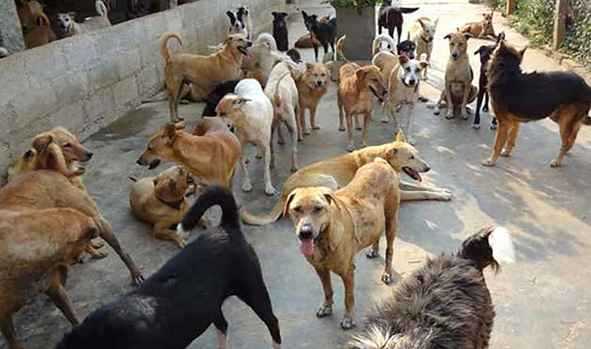
Facing over two lakh reported dog bite cases and a stern reprimand from the Supreme Court, the Jammu and Kashmir administration has launched a comprehensive, region-wide initiative to protect schools, hospitals, and other public institutions from the growing stray dog menace.
The measures follow the apex court’s directions in Suo Motu Writ Petition (C) No. 5 of 2025, ‘City Hounded by Strays, Kids Pay Price’ vs State of Andhra Pradesh, prompting the Union territory administration to issue Order No. 1497-JK(GAD) of 2025 and set up new institutional mechanisms to ensure full compliance.
According to the order, the Prevention of Cruelty to Animals Act and the Animal Birth Control (Dog) Rules, 2023, would be enforced by a UT-level committee led by the Administrative Secretary of the Agriculture Production Department. The committee’s job is to determine which high-traffic areas – schools, colleges, hospital complexes, PHCs, sports fields, bus terminals, train stations, and others – need urgent safety enhancements.
Officials have directed the heads of these institutions to fortify their premises with boundary walls, secure gates or other administrative interventions under district and municipal supervision. Municipal bodies have also been instructed to capture stray dogs found inside institutional areas and transport them to designated shelters for sterilisation and vaccination, in accordance with the rules.
“All procedures, from catching to sheltering, will be humane. We cannot compromise on that. The apex court's directions will be followed in letter and spirit,” said a senior official involved in the rollout.
The Supreme Court has barred the release of sterilised dogs back into the same institutional premises, a condition the UT-level committee will monitor through quarterly reviews. Departments will be assigned specific responsibilities and timelines, with the possibility of action against officials who fail to comply.
District administrations have separately been asked to ensure sufficient stocks of anti-rabies vaccines and immunoglobulin in hospitals and to expand awareness campaigns on safe behaviour around animals. Deputy Commissioners will head district-level committees, prepare periodic compliance reports and coordinate with civic bodies to eliminate stray dog colonies around identified zones.
Parents and residents, especially in urban areas like Srinagar, have cautiously welcomed the move amid rising anxiety over dog attacks. “The dog problem has become serious near schools. If this is implemented properly, it will help children walk without being scared again,” said Shabir Ahmad, a parent from Bemina.
Animal lovers, while sharing their apprehension, said the new system must strike a balance between public safety and humane treatment. “We are not opposing the Court's directions. But at the implementation stage, a proper mechanism must be in place. Stray dogs need care too. Catching them roughly or relocating them without proper shelters will only create more problems,” said Mehvish, a volunteer from Srinagar.
Last month, Chief Minister Omar Abdullah informed the J&K Legislative Assembly that between 2022 and 2025, 2,12,968 dog bite cases were reported in J&K during the last four years. Of them, over 1.14 lakh cases were reported in Kashmir and over 98,000 in Jammu.
He had also said that a total of 49,000 stray dogs were sterilised and vaccinated in accordance with the ABC Rules 2023. “...Of them, the two major municipalities covering the capital cities Srinagar and Jammu have sterilised and vaccinated 27,237 and 13,730 dogs, respectively. But only 161 dogs were sterilised in the rest of the civic bodies in Kashmir, and 7,870 cases in Jammu,” he had said.

Facing over two lakh reported dog bite cases and a stern reprimand from the Supreme Court, the Jammu and Kashmir administration has launched a comprehensive, region-wide initiative to protect schools, hospitals, and other public institutions from the growing stray dog menace.
The measures follow the apex court’s directions in Suo Motu Writ Petition (C) No. 5 of 2025, ‘City Hounded by Strays, Kids Pay Price’ vs State of Andhra Pradesh, prompting the Union territory administration to issue Order No. 1497-JK(GAD) of 2025 and set up new institutional mechanisms to ensure full compliance.
According to the order, the Prevention of Cruelty to Animals Act and the Animal Birth Control (Dog) Rules, 2023, would be enforced by a UT-level committee led by the Administrative Secretary of the Agriculture Production Department. The committee’s job is to determine which high-traffic areas – schools, colleges, hospital complexes, PHCs, sports fields, bus terminals, train stations, and others – need urgent safety enhancements.
Officials have directed the heads of these institutions to fortify their premises with boundary walls, secure gates or other administrative interventions under district and municipal supervision. Municipal bodies have also been instructed to capture stray dogs found inside institutional areas and transport them to designated shelters for sterilisation and vaccination, in accordance with the rules.
“All procedures, from catching to sheltering, will be humane. We cannot compromise on that. The apex court's directions will be followed in letter and spirit,” said a senior official involved in the rollout.
The Supreme Court has barred the release of sterilised dogs back into the same institutional premises, a condition the UT-level committee will monitor through quarterly reviews. Departments will be assigned specific responsibilities and timelines, with the possibility of action against officials who fail to comply.
District administrations have separately been asked to ensure sufficient stocks of anti-rabies vaccines and immunoglobulin in hospitals and to expand awareness campaigns on safe behaviour around animals. Deputy Commissioners will head district-level committees, prepare periodic compliance reports and coordinate with civic bodies to eliminate stray dog colonies around identified zones.
Parents and residents, especially in urban areas like Srinagar, have cautiously welcomed the move amid rising anxiety over dog attacks. “The dog problem has become serious near schools. If this is implemented properly, it will help children walk without being scared again,” said Shabir Ahmad, a parent from Bemina.
Animal lovers, while sharing their apprehension, said the new system must strike a balance between public safety and humane treatment. “We are not opposing the Court's directions. But at the implementation stage, a proper mechanism must be in place. Stray dogs need care too. Catching them roughly or relocating them without proper shelters will only create more problems,” said Mehvish, a volunteer from Srinagar.
Last month, Chief Minister Omar Abdullah informed the J&K Legislative Assembly that between 2022 and 2025, 2,12,968 dog bite cases were reported in J&K during the last four years. Of them, over 1.14 lakh cases were reported in Kashmir and over 98,000 in Jammu.
He had also said that a total of 49,000 stray dogs were sterilised and vaccinated in accordance with the ABC Rules 2023. “...Of them, the two major municipalities covering the capital cities Srinagar and Jammu have sterilised and vaccinated 27,237 and 13,730 dogs, respectively. But only 161 dogs were sterilised in the rest of the civic bodies in Kashmir, and 7,870 cases in Jammu,” he had said.
© Copyright 2023 brighterkashmir.com All Rights Reserved. Quantum Technologies